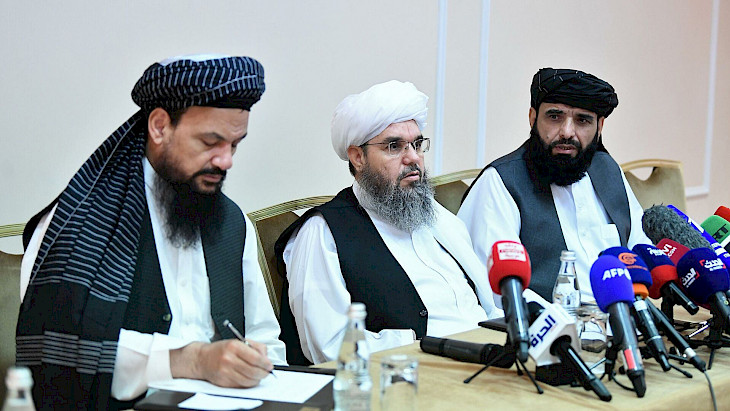Will Kyrgyzstan recognize the Taliban following Kazakhstan, asks the author of the article in Vesti.kg Mikhail Gottfried.
Below is a look at the development of events in the region in light of the current Afghan authorities' activation in Central Asia.
Kazakhstan has excluded the Taliban movement from the list of terrorist organizations. This was announced by the President of the Republic of Kazakhstan Kassym-Jomart Tokayev at a meeting with the speakers of the chambers of parliaments of the CSTO countries.
The Russian authorities are considering a similar decision.
In Kyrgyzstan, the Taliban is on the list of terrorist organizations whose activities have been banned in the republic since September 2006. It was included in the list based on the decision of the Pervomaisky District Court of Bishkek. However, since August 2021, the Taliban has been the ruling regime in Afghanistan, with which many countries are building relations, including the Central Asian republics.
“Negotiations with the movement can be considered a positive factor in favor of stabilizing the situation in the region,” political scientist Mars Sariev believes in an interview with Vesti.kg. “There are two main doctrines. The first, according to which we have been acting to this day, involves the creation of a line of defense against Afghanistan, borders along the Afghan-Tajik border. This is a military doctrine and it is quite unconstructive. The other position involves a peaceful resolution of issues through negotiations, recognition by the world community and infrastructure development. Since this will allow Afghanistan to develop economically and stabilize the situation both inside the country and in Central Asia and the Middle East."
The attitude towards Afghanistan as a hostile territory, the desire to fence itself off from it, to isolate it, contributes to the creation of a "gray" zone there, uncontrolled by the authorities.
"Today, extremist groups are being drawn there from the Middle East, from the south of Afghanistan - the so-called "Durand Line" on the border with Pakistan. A dangerous accumulation of forces is being created that can invade post-Soviet Central Asia: Tajikistan, Kyrgyzstan, Kazakhstan and all the way to Russia. According to some data, including the Russian Ministry of Defense, there are up to 60 thousand militants in these groups. They are not under the control of the Taliban,” he noted.
According to the political scientist, in this situation, the initiatives of Kazakhstan and Russia are systematic and well-thought-out.
“As Tokayev said, Kazakhstan removed the Taliban from the list of banned organizations. The Russian Foreign Ministry and the Ministry of Justice have proposed to their authorities to do the same. Thus, gradually all Central Asian countries can remove the Taliban from the list of banned organizations. This is facilitated by the fact that Kazakhstan, Uzbekistan, and other countries are going to build large infrastructure projects in Afghanistan. Russia is going to join in, as is China. This is the construction of a railway, the arrangement of access to sea borders, the development of mineral deposits (almost the entire periodic table is present there). Only a constructive approach will help stabilize the region,” the expert believes.
To clarify, the head of the Republic of Kazakhstan Kassym-Jomart Tokayev clarified that the decision was made based on the importance of developing trade and economic cooperation with modern Afghanistan and the understanding that the Taliban regime is a long-term factor.
The radical Islamist militant movement Taliban has ruled Afghanistan since August 2021, having overthrown the government of President Ashraf Ghani. The Taliban are not recognized by UN member states, but many states and international organizations maintain contacts with the movement. For example, the construction of the Kushtepa irrigation canal in Afghanistan, which is currently being carried out by the Taliban and costing about $700 million, was thought out thanks to the support of USAID. In 2018, they announced the development of a feasibility study for the canal. The Taliban began implementing the project in 2022.
Mikhail Gotfried
Source: Vesti.kg
CentralasianLIGHT.org
October 30, 2024

